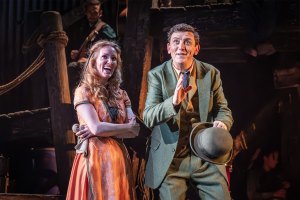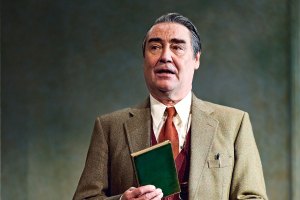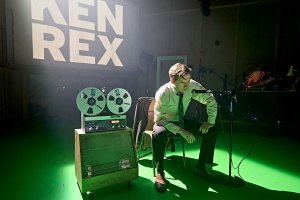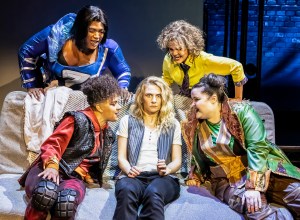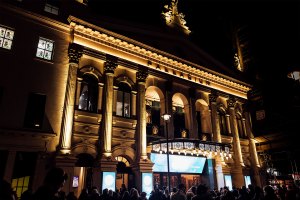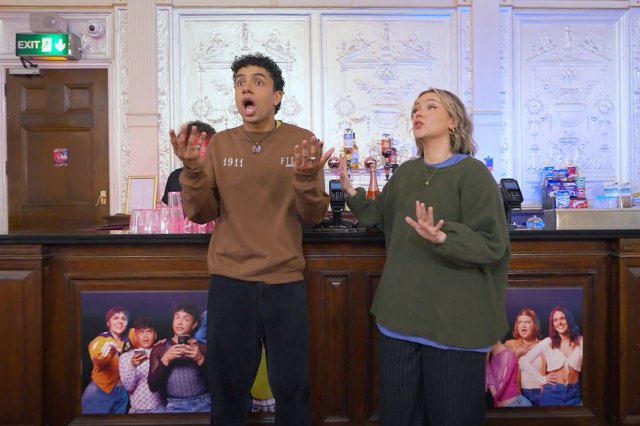Review: Faith Healer (The Old Vic)
Michael Sheen, Indira Varma and David Threlfall star in the new series
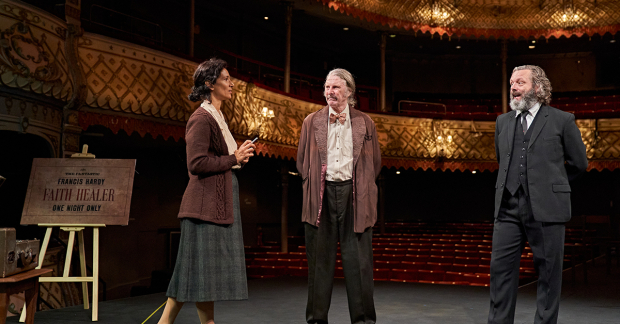
© Manuel Harlan
Brian Friel's Faith Healer is one of my favourite plays, a work whose apparent simplicity – four monologues from three people remembering the same events from their different points of view – conceals an intricate web of memory and loss, belief and cynicism, fact and fiction. I've watched it all over the place, with many different casts. But I've never before seen it from my own kitchen.
The act of digital distancing in the Old Vic's In Camera series – with the performances live on stage, while the audience watches via a screen – affects the play, bringing different resonances to life as its story of the life and death of Frank Hardy, the faith healer of the title, slowly unfolds. With the help of barebones designs from Rob Howell and lighting from Tim Lutkin and Sarah Brown, director Matthew Warchus plays on the unusual beats: the close up of the cameras allows details to work; the big picture is evoked by the way the empty seats of the Old Vic conjure the sparsely-populated halls of Scotland and Wales where Frank puts on his "performance".
"Occasionally it worked," says Michael Sheen, in the title role, rolling the towns visited during his "vocation without a ministry" around his mouth in a rich incantation, walking through a backlit line of empty chairs. Sheen catches Frank's charm, his performative creation of himself, his fabulist's mingling of truth and lies where even he barely knows the distinction between the two.
Sometimes filmed in disconcerting close up, you see the little flicker of doubt in his eyes, the juts of his head and hesitations of hand, tiny indications that he might not absolutely believe the fluent tale he is telling. As the mood darkens, he grows stiller, quieter, a lost man in a shabby black coat silhouetted against a black sky, finally shedding doubt as he meets his destiny.
It's a towering performance – theatrical even on film – and it's more than matched by Indira Varma as Grace, Frank's traduced and tragic wife. When Sheen describes her there's always a look of bitterness that sneaks across his face; when we meet her in her own monologue, delivered from the chair where she hunches, measuring her days and her sanity in terms of how many cigarettes she has smoked and drinks she has taken, there is only an obsessive vulnerability. Varma brings out with brilliant, tightly coiled intensity just what Grace has lost – but also what she found, why she clung to Frank so painfully.
As Teddy, Frank's business manager, David Threlfall has the hardest time compensating for the lack of an audience. Teddy's great third-act turn which combines his memories of his previous successes – a whippet who could play Come Into the Garden Maude on the bagpipes – with the agonised memory of life on the road with Frank and Grace – "why didn't I leave them and get something simple like a whistling dolphin?" – pivots on the contrast between its high humour and terrible sadness. It functions, in the play, both as Shakespearean light relief and the delicate tipping point into full tragedy.
It's hard to make work in silence, without an audience, but Threlfall, his long gray hair pulled behind his head in a pigtail, his glasses tipping down his nose, wheezing his way through endless "dear hearts" creates an affecting picture of a man whose love and loyalty has left him beached, with only his unreliable memories of past glories for company.
It's the unreliability of all memory – and conversely, the way that each story told has its own truth – that makes Faith Healer such a towering play. In each of the monologues, many details are entirely different; the same events are not only seen and interpreted in different lights, but actually experienced in different ways. But also, running through Friel's poetic and brilliantly detailed prose, are sentences that are precisely the same, tying this ill-matched trio into a common history of Frank's ability to create magic, as well as its bitter opposite.
It makes it, among many other things, a perfect metaphor for theatre itself, for that sense of communal interpretation of a shared story. Experiencing it at distance is bitter-sweet, both of a reminder of what great theatre can do, and a sense of its echoing absence.




